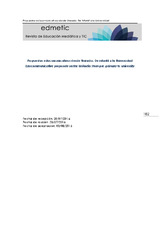Mostrar el registro sencillo del ítem
Propuestas educomunicativas desde Uniradio: de infantil a la Universidad
| dc.contributor.author | Contreras Pulido, Paloma | |
| dc.contributor.author | Duarte Hueros, Ana | |
| dc.contributor.author | Guzmán Franco, M. Dolores | |
| dc.date.accessioned | 2016-12-19T09:32:41Z | |
| dc.date.available | 2016-12-19T09:32:41Z | |
| dc.date.issued | 2016 | |
| dc.identifier.issn | 2254-0059 | |
| dc.identifier.uri | http://hdl.handle.net/10396/14213 | |
| dc.description.abstract | La radio, como medio de comunicación social presenta un gran potencial como espacio abierto a la participación de todo el mundo –mayores y pequeños-. El eje vertebrador de este estudio ha sido describir una serie de buenas prácticas que hemos llevado a cabo en Uniradio, emisora de radio de la Universidad de Huelva, en colaboración con maestros, educadores y familias. Prácticas en las que hemos pretendido dar voz a los más pequeños, convirtiéndoles en los verdaderos protagonistas de la comunicación, expresando sus ideas, sentimientos y necesidades, haciéndolos así partícipes activos de la sociedad que les rodea, y tomando como eje central de nuestra actividad lo que en su momento el profesor Pérez Tornero denominaba: "aprender a vivir en el entorno vital que generan los medios". En base a la reflexión crítica sobre estas prácticas, pretendemos contribuir a orientar y dar pautas sobre cómo se pueden llevar a cabo buenas prácticas educomunicativasbasadas en la etapa Infantil, como propuestas integradas en la formación inicial del Grado universitario de Educación Infantil, en el marco de las materias de “TIC aplicadas a la Educación Infantil”, y “Cultura, valores y medios de comunicación” de 1º y 2º curso respectivamente. | es_ES |
| dc.description.abstract | Radio as a means of social communication has great potential. It is an open space for the participation of everyone - children and seniors. In this study, our intention was to describe a number of good p ractices that have been carried out in Uniradio , radio station of the University of Huelva, in collaboration with teachers, educators and families. Radio as a means of social communication has great potential because it is an open space for the participati on of all the world - children and seniors. In this study, our intention was to describe a number of good practices that have been carried out in Uniradio , radio station of the University of Huelva, in collaboration with teachers, educators and families. Pra ctices in which we have tried to give voice to children, making them the real protagonists of communication, expressing their ideas, feelings and needs, thus making them active participants in the society around them, and taking as the core of our business what at the time professor Pérez Tornero (2009) called "learn to live in the living environment generated by the media" . Based on critical reflection on these practices, we would like to help to guide and provide guidelines on how to conduct good educommu nicative practices based on the infant stage, as integrated into the initial training of university degree in Early Childhood Education in the framework of the materials proposed of "ICT in Early Childhood Education" and "Culture, values and media". Subj ects taught in 1st and 2nd year respectively. | es_ES |
| dc.format.mimetype | application/pdf | es_ES |
| dc.language.iso | spa | es_ES |
| dc.publisher | Universidad de Córdoba, UCOPress | es_ES |
| dc.rights | https://creativecommons.org/licenses/by/3.0/ | es_ES |
| dc.source | Edmetic 5 (2), 182-201 (2016) | es_ES |
| dc.subject | Alfabetización mediática | es_ES |
| dc.subject | Educación infantil | es_ES |
| dc.subject | Educomunicación | es_ES |
| dc.subject | Formación del profesorado | es_ES |
| dc.subject | Media literacy | es_ES |
| dc.subject | Early childhood education | es_ES |
| dc.subject | Educommunication | es_ES |
| dc.subject | Teacher training | es_ES |
| dc.title | Propuestas educomunicativas desde Uniradio: de infantil a la Universidad | es_ES |
| dc.title.alternative | Educommunicative proposals on the Uniradio: from pre-primary to university | es_ES |
| dc.type | info:eu-repo/semantics/article | es_ES |
| dc.relation.publisherversion | http://www.uco.es/ucopress/ojs/index.php/edmetic/index | es_ES |
| dc.rights.accessRights | info:eu-repo/semantics/openAccess | es_ES |

